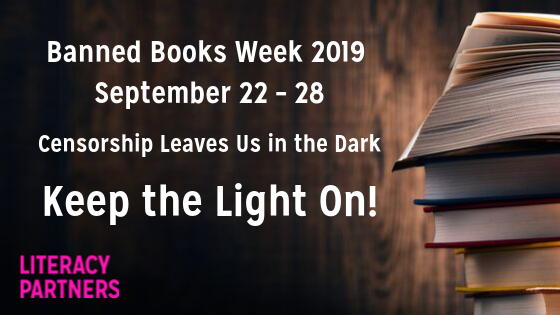
Since 1982, the American Library Association (ALA) Office for Intellectual Freedom brings attention to the most challenged books across the country. Every year, they gather a list of books that have been censored and highlight the importance of freedom of speech and tolerance. The list of banned books range from popular picks like the Harry Potter saga, American classics such as To Kill a Mockingbird to children’s books like And Tango Makes Three. To see a list of the most challenged books, click here.
We are joining the ALA’s efforts by sharing some of our staff’s favorite banned books! From classics to young adult novels, we all have a favorite banned book! Which one is your favorite banned book?
Anthony Tassi, CEO
Banned Book Chosen: 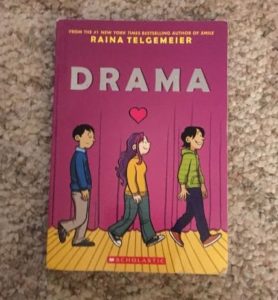
Drama written and illustrated by Raina Telgemeier
Why was this book banned?
LGBTQ characters portrayed with humanity.
Why do you love this book?
My daughter is all about the middle grade girl books. Raina’s series of graphic novels are sweet, funny, and somehow reassuring that nobody has it easy and life is not full of answers, but questions and choices.
Why is literacy and access to books important to you?
Sometimes when you know that your child is having certain experiences but she doesn’t want to talk about them, reading a book about other children having similar experiences is a great way to get the conversation going. In the guise of talking about a book and its fictional characters, you can talk directly to your child. They are smart enough to get the message and appreciate the effort.
Michael Kengmana, ESOL Teacher
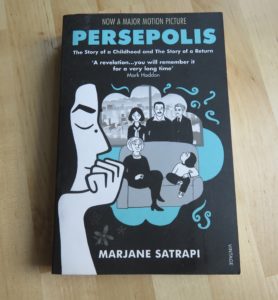 Banned Book Chosen:
Banned Book Chosen:
Persepolis by Marjane Satrapi
Why was this book banned?
Gambling, offensive language, and political viewpoint. Additional reasons: “politically, racially, and socially offensive” and “graphic depictions.”
Why do you love this book?
It was an emotional and deep look at what Iran was like during the 1979 revolution as well as the Iran-Iraq War. It took me beyond the historical events and into how it affected the lives of everyday Iranians. It was also a very eye opening book for many of my high school students who had little to no knowledge of Iran or its history.
Why is literacy and access to books important to you?
Literacy opens up the world to people by helping us communicate with each other across space and time. It allows us to learn about the lives and histories of people and places that we would have very little access to or awareness of otherwise. This access to literacy and books is critical to freedom of expression and our understanding of others. Without this, it becomes extremely difficult to break out of the small and often narrow perspectives of the world we have. This inability to broaden our consciousness also typically comes at the expense of those who are marginalized in society, perpetuating cycles of poverty, racism, sexism, homophobia, and many other forms of discrimination.
David Rothenberg, Program Director
Banned Book Chosen: 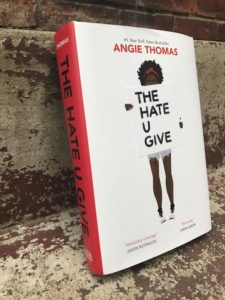 The Hate U Give by Angie Thomas
The Hate U Give by Angie Thomas
Why was this book banned?
Anti-police; profanity, drug use, and sexual references.
Why do you love this book?
It reflects the reality for many communities of color, the difficulty of achieving the American dream, and the reasons why community remains an important and integral part of one’s identity. The book addresses those who make the decision to leave their community and have the determination to escape and find a better life, as well as those who make the decision to stay in their community and have the determination to make it a better place for everyone within the community.
What is your favorite quote from this book?
“Sometimes you can do everything right and things will still go wrong. The key is to never stop doing right.”
Why is literacy and access to books important to you?
We should all have the right to explore the vast amount of literature that gives us the opportunity to discover the truth for ourselves. Without access to differing opinions and historical conceptualizations, we are led to believe what others want us to believe and lose the ability to arrive at our own conclusions.
Gohar Chichian, Senior Manager of Development & Communications
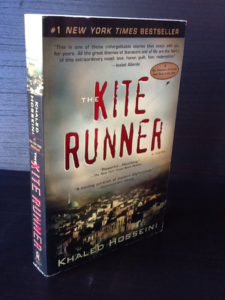 Banned Book Chosen:
Banned Book Chosen:
The Kite Runner by Khaled Hosseini
Why was this book banned?
Homosexuality, offensive language, religious viewpoint, and sexually explicit.
Why do you love this book?
The Kite Runner is a beautiful and devastating story told over several decades. It touches upon so many important themes: family ties, friendship, love, forgiveness, and betrayal, with political and ethnic tensions as the backdrop. Amir and Hassan’s story is heartbreaking, but it is a page-turner and the story of their friendship will always stay with you.
What is your favorite quote from this book?
“And that’s the thing about people who mean everything they say. They think everyone else does too.”
Why is literacy and access to books important to you?
Literacy is the foundation to everything we do, and access to books is key. Reading as a child (and into adulthood) has helped me open my mind to new worlds, ideas, and perspectives. It was an escape, an inspiration, and an addiction. I can’t imagine a life without books.
Michelle López, National Director of Parent Education
Banned Book Chosen: 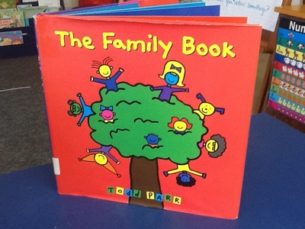 The Family Book By Todd Parr
The Family Book By Todd Parr
Why was this book banned?
Families coming in all shapes, sizes, and colors is the theme of this popular Todd Parr book. But concerns over depicting families that have two moms or two dads kept this bold and colorful paperback off the shelves in the Erie School District in Illinois in 2012. Ages: 5-6.
Why do you love this book?
I love this book because of all the reasons it was banned – it shows the many ways families present in this country. I was looking for a book for my 1.5-year old nephews, who were about to experience a new family dynamic as a result of divorce. I figured the sooner we started introducing the idea of varying family structures, the better it was for establishing normalcy. They are almost 2.5 now, and it is still a favorite read. The illustrations are so colorful and sweet. The reason it is now one of my favorite “banned” books is because my nephews now make connections with children in our dear community, who have 2 dads and some have 2 moms. Now, when they get to the picture of 2 moms, they say, “some families have a Momma and a Titi,”… my sister and me <3. Although they are loved by all of their family – I like that they fit me into the narrative of who is their family.
What is your favorite quote from this book?
I love the dedication: “To my family- who sometimes did not understand me, but encouraged me to go after everything I wanted even when we did not agree. As I now realize – this takes a lot of love to do.”
Why is literacy and access to books important to you?
Literacy begins at home, and children rely on all members of their family to build important brain connections through bonding. It is important to give them language about how to talk about their family- and give them language both visual and verbal to understand that families can come in many variations. They can be excited and proud of their family while being accepting of others. Social-emotional learning is key to raising adaptive and resilient humans – this book, unlike most other family stories says, “family is a unique experience.” It makes space for other outcomes, so children can imagine they fit in from the start. Access to books that expand possibilities and open the door to conversation give families the visual language to safely introduce difficult conversations too – and if you are lucky, you’ll have a book from the Todd Parr collection that approaches diversity and inclusion from a place of strengthen.
